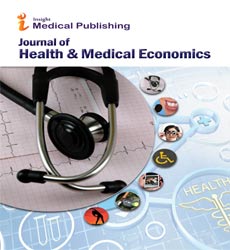HealthCare and Medical Education
Mike Smith
Mike Smith*
College of Medicine, University of Nigeria, Enugu, Nigeria
- *Corresponding Author:
- smithmike98@gmail.com
College of Medicine, University of Nigeria, Enugu, Nigeria
E-mail: smithmike98@gmail.com
Received Date: September 09, 2021; Accepted Date: September 24, 2021; Published Date:September 30, 2021
Citation: Smith M (2021) Health Care and Medical Education. J Health Med Econ. Vol.7 No.5:62.
Medical practice should intertwine bar of risks associated with its efficaciousness, master innovation through analysis and manage prices with humanity. Within the face of triumphalist scientific outcomes and technical feats, which, for some, appear to equate novelty to progress, the Hippocratic Oath phrasepremium noncreamy appear to be obsolete. Is it not true thatmost believe that innovation in itself is best medical care, far more than the requirement for evaluation? Medical education these days privileges scientific information and clinical facts however tends toneglect teaching social skills (communication, team work), the flexibility to implement change, to appraise new info, and to acknowledge the chance of medical errors and theway to manage them. However, the existence of legal obligations requiring providing adequate info to patients regarding the risks of treatment in addition as information about the standard of care and safety indicators in health care establishments, shows that theobsolescence isn't wherever some suppose it's. Practice should be schooled and organizedin the name of connectedness and safety of health care. The time of individualists, a doctorwho will decide alone, basing call solely on his or her conscience is over. Medicaldecision-making needs to be a conjunct and multidisciplinary action. Sensible observe andcontinuity of care suppose team cohesion. Routine analysis of adverse events and preventionof errors square measure extremely enthusiastic about high-rate organization. It’s at intervals this framework that anaccreditation system was projected to doctors active in danger specialties. We tend to describe herein this idea of enfranchisement and the way, ranging from this, we are able to conceive and construct a brand new teaching paradigm for ‘‘at risk’’ medical specialties. In 2004, a French national study calculable that the incidence of adverse events arising in health care establishments through healthcare facility infections, inadequate use of medical products or invasive procedures was some where between 350,000 and 460,000 each year, that is 6.6 per a thousand hospital days. One third of those were judged to be preventable. That same year, many physicians operating within the personal sector found themselves confronted with associate uncommon increase in their insurance premiums for skilled liability responsibility. They projected that if they committed themselves, on a voluntary basis, to participatein the bar of avertible medical events, the National Medical Insurance Company would contribute financially to their premium. This was known as ‘‘individual certification ofphysicians in specialties at risk’’. Once the thought was thought to possible, the implementation was confided to the French National High Authority of Health. The technique projected to certify physicians is ana posterioririsk management method, that is, supported sharing one’s expertise. The physicians engaged within the procedure are required to point the risk-prone events (RPE) they need encountered in their observe.RPE square measure those who may are liable for severe adverse events except for onereason or another, were known and corrected in time, avoiding the complication. Randomised studies square measure obviously associate ineluctable tool to indicate efficaciousness (as opposed to effectiveness), and might result in recommendations ‘‘what to do’’ or ‘‘not to do’’. Paradoxically, the rigor of this methodology doesn't continually provoke surgeons to adhere to the recommendations. The methodology of therapeutic trials is usually perceived as ‘‘artificial’’ and much from‘ ‘true life’’ things, thus pricey to physicians. EBM is said to misjudge personal expertise and to be incapable ofreproducing objective ‘‘truth’’. Certainly, for physicians, their personal expertise, their daily supply of data,needs be taken under consideration. This same typeofa posteriorianalysis is employed for morbidity and mortalityconferences, additionally a legal obligation within the third version ofinstitutional certification.
Open Access Journals
- Aquaculture & Veterinary Science
- Chemistry & Chemical Sciences
- Clinical Sciences
- Engineering
- General Science
- Genetics & Molecular Biology
- Health Care & Nursing
- Immunology & Microbiology
- Materials Science
- Mathematics & Physics
- Medical Sciences
- Neurology & Psychiatry
- Oncology & Cancer Science
- Pharmaceutical Sciences
